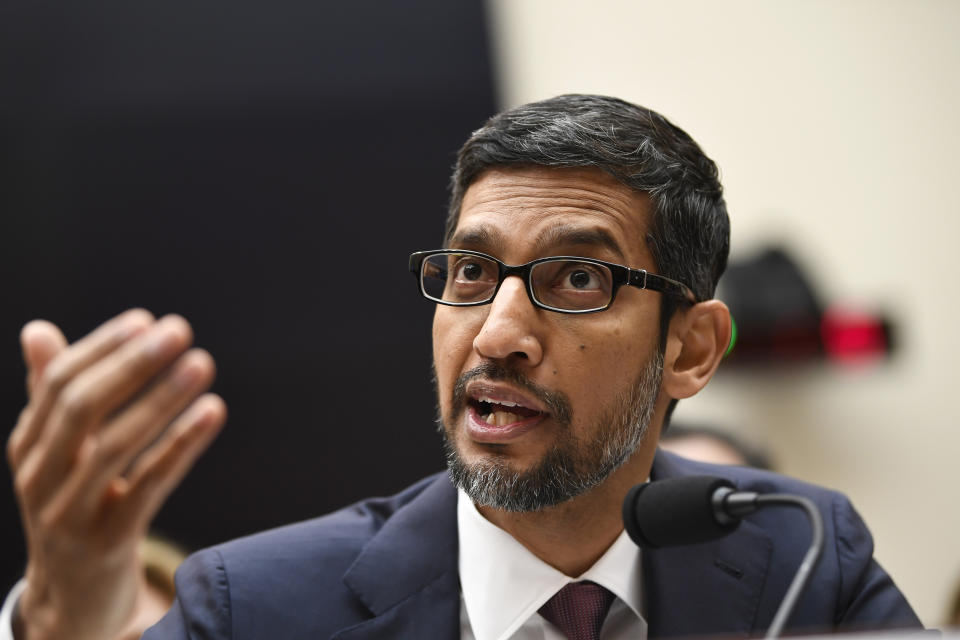Google's public response to Russian trolls is very different from Facebook's

Google (GOOG, GOOGL) is still fighting Russian agitators seeking to penetrate its services in an effort to spread disinformation and sow discord among Americans. That’s according to CEO Sundar Pichai, who sat before the House Judiciary Committee on Tuesday to discuss how the search giant collects user data.
The hearing, which conservative lawmakers primarily used to grill Pichai about a perceived, but unproven, liberal bias in the search giant’s products, also touched on the clarity of Google’s terms of service, its proposed Chinese search engine, and how the company protects user data.
However, one of the more interesting parts of the hearing centered on Google’s efforts to combat combat Russian, and now Iranian, operatives who are trying to game the company’s systems to spread propaganda. Pichai’s comments on that point provided a stark contrast to how Facebook (FB) has been handling its ongoing fight against Russian and Iranian trolls.
How Google’s response compares
Tuesday also marked the first time Pichai has appeared before Congress. Facebook CEO Mark Zuckerberg and Twitter CEO Jack Dorsey, on the other hand, had previously appeared before members of Congress to answer for how their respective organizations are handling the threat of disinformation and future election interference.
Of the three big tech companies that saw their platforms abused in the lead-up to the 2016 election and beyond, Google seems to have received the least amount of scrutiny from lawmakers. The search giant, like Facebook, initially said that it found no evidence of Russian operatives purchasing ads on its platforms, only to recant. In October of 2017, Google acknowledged that Russian agents did, in fact, buy ads and ran two large YouTube accounts.
Of course, Facebook’s 2016 election issues were further compounded by the Cambridge Analytica scandal, which broke in March 2018 and showed that the social network had lost the data of millions of users to a company seeking to elect President Donald Trump.
In an effort to right its ship and offer consumers, and investors, a clearer look into the company, Facebook has repeatedly released announcements whenever it finds large-scale disinformation efforts, or coordinated inauthentic behavior, as the social network refers to it. Google, on the other hand, hasn’t been quite as open: We’ve gotten a handful of reports from the company, but nothing near the level of what Facebook has provided.
Similarly, Google hasn’t offered up its top executives as Facebook, and even Twitter, have. In September, Google famously refused to make Pichai or Larry Page, co-founder and CEO of Google parent company Alphabet, available for a Senate hearing, and instead said it would send senior vice president of global affairs Kent Walker. He was rebuffed, and Google was represented by an empty chair.
Trolls were active during 2018 midterms
During his testimony, Pichai explained that Google saw limited activity from Russia’s Internet Research Agency and the Iranian government in the lead-up to the 2018 midterm elections. Those efforts seemingly fell well short of Russia’s 2016 interference campaign, but Pichai’s comments also suggested the groups aren’t giving up anytime soon.
“We have undertaken a significant review of how ads are bought,” Pichai explained. “You know, we look for the origin of these accounts, we share and collaborate with law enforcement, other technology companies and we essentially are investing a lot of effort in oversight in this area.”
Karen Bass (D-California) questioned Pichai as to how Google is working to combat the kinds of bots that can overwhelm websites or be used to push negative comments on services like YouTube. Russia and Iran use bots in their propaganda campaign to publish negative comments and downvote stories on YouTube.
“Will you expand your staff, or modify the algorithms, in an effort to identify and eradicate the online trolls. And then in terms of the flooding that takes place with bots, what specifically will you do to address this?” Bass asked.
According to Pichai, bots are something that Google has been attempting to fight for years, and is continuing to do so.
“This is something we actually face across the set of products today, be it our ad systems, be it our search products, people are trying to spam and be it YouTube and so on. So in general we’ve built systems over the years to detect anomalous traffic patterns and mitigate that. We also learn, we collaborate with others. Law enforcement has been very helpful to us in this regard.”
Google’s 2016 findings
According to Pichai, in the lead-up to the 2016 elections two main Russian-linked accounts advertised on Google for $4,700. And while that’s not a huge amount of money, Pichai stressed that any cash foreign actors used to purchase ads was too much. Since then, the CEO said his company has been able to “dramatically increase” the protections around its election offerings.
But as committee member Jerrold Nadler (D-New York) pointed out, Google-owned YouTube also had to remove several channels associated with Russia’s disinformation campaign — and these channels had created thousands of videos.
Foreign agents interfering with Google’s systems isn’t the company’s only issue. The tech giant has consistently taken heat for allowing conspiracy theories to propagate on YouTube. And while Google has said it is working to ensure such videos don’t appear as frequently, they still creep into view during major media events.
For example, in November, Motherboard found that a search for “California Wildfires” on YouTube provided users with suggestions for things like “lasers” and “direct energy weapon.”
These kinds of conspiracies could be used by foreign actors to try to influence public opinion and manipulate the populous. In other words, it’s not just a couple of weirdos who think the moon landing was faked anymore.
More from Dan:
Email Daniel Howley at [email protected]; follow him on Twitter at @DanielHowley. Follow Yahoo Finance on Facebook, Twitter, Instagram, and LinkedIn.www.cerveza-artesanal.com/
